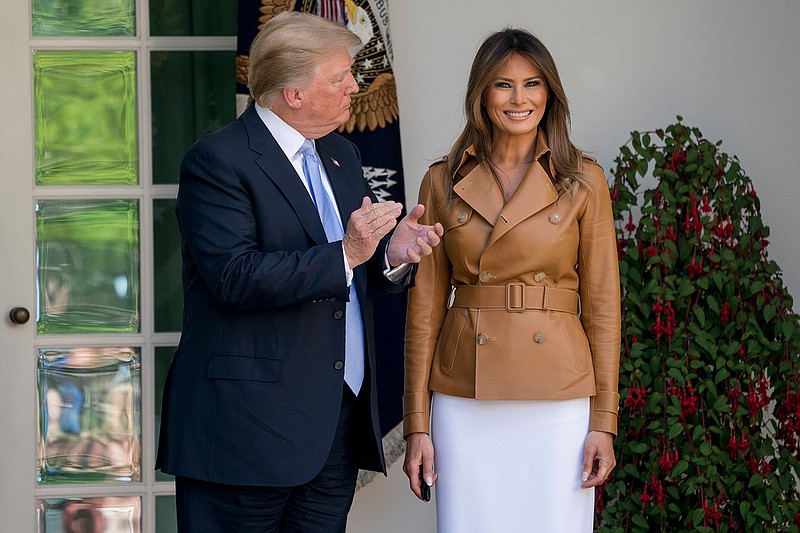WASHINGTON-Melania Trump returned to the White House in "high spirits" on Saturday following a weeklong hospitalization for kidney treatment, a lengthy stay that raised questions about whether the first lady's condition may have been more complicated than first revealed.
President Donald Trump heralded her homecoming with a tweet that referred to her as "Melanie" instead of "Melania."
"Great to have our incredible First Lady back home in the White House. Melanie is feeling and doing really well. Thank you for all of your prayers and best wishes!" Trump wrote before quickly superseding that tweet with another that spelled his wife's name correctly.
Mrs. Trump's quiet return to the White House, her husband and their 12-year-old son, after five days at a nearby U.S. military hospital resolved a brewing mystery about when she would eventually be released. What remain are questions about the state of her health.
Her spokeswoman, Stephanie Grisham, has declined to release additional details, citing Mrs. Trump's right to privacy.
"The First Lady returned home to the White House this morning," Grisham said in an emailed statement. "She is resting comfortably and remains in high spirits. Our office has received thousands of calls and emails wishing Mrs. Trump well, and we thank everyone who has taken the time to reach out."
She had been at Walter Reed National Military Medical Center near Washington since Monday, when she had an embolization procedure to treat an unspecified kidney condition the White House described as benign. Word of the hospitalization came as a surprise as there was no indication during her public appearances in recent weeks, including during a state visit by France's president, that Mrs. Trump had been ailing.
One week before the procedure, a beaming Mrs. Trump, 48, presided over a splashy announcement ceremony in the White House Rose Garden to introduce her "Be Best" public awareness campaign to help teach kindness to children.
Grisham said Monday that the procedure was "successful," there were no complications and that Mrs. Trump would probably remain hospitalized for "the duration of the week."
The president then tweeted Tuesday that his wife would be released in "2 or 3" days, but Thursday and Friday passed without word from the White House on her whereabouts. Trump had visited her during her first three days of hospitalization. But he did not visit Thursday or Friday, leading some to wonder whether that meant the first lady had been discharged.
The first lady said Wednesday on Twitter that she was "feeling great" and looking forward to going home, but gave no indication of when that might happen. On Friday, she tweeted about the deadly school shooting at a Houston-area high school but did not update her followers on her medical situation.
Urologists with no personal knowledge of Mrs. Trump's condition said the most likely explanation for the procedure is a kind of noncancerous kidney tumor called an angiomyolipoma. They're not common but tend to occur in middle-aged women and can cause problematic bleeding if they become large enough, said Dr. Keith Kowalczyk of MedStar Georgetown University Hospital.
Grisham on Saturday characterized speculation about the first lady as "uninformed," adding that every patient is different.
"Mrs. Trump has a medical team that is comfortable with her care, which is all that matters," she said. "Her recovery and privacy are paramount and I will have no further comment beyond this."
AP Medical Writer Lauran Neergaard contributed to this report.

